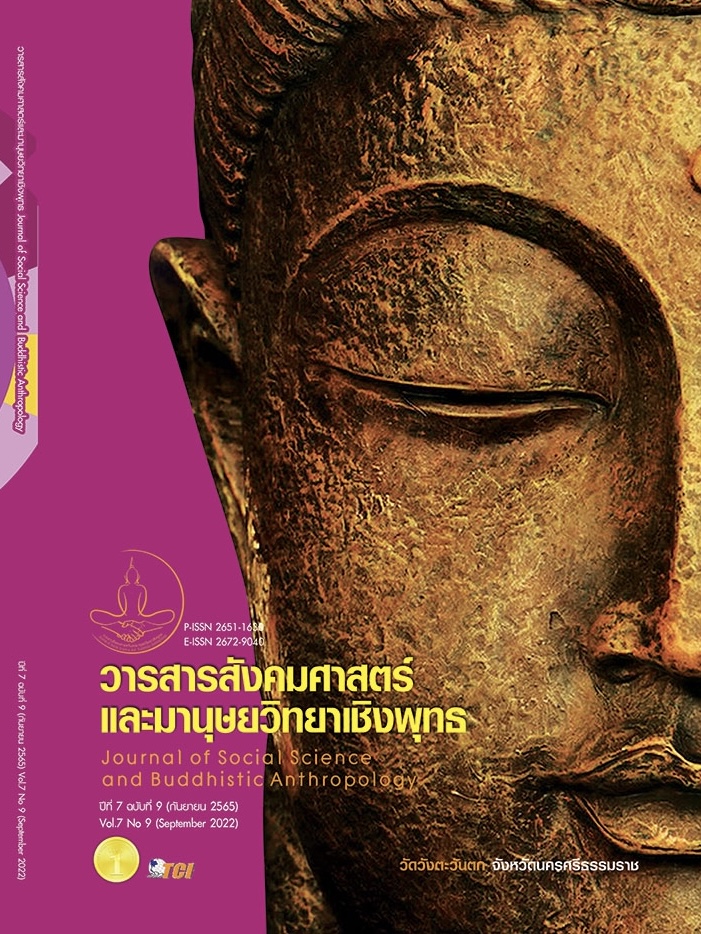USAGE OF CREATIVE ART PROCESS IN CAREER PREPARATION FOR A STUDENT WITH LOW VISION AND MULTIPLE DISABILITIES
Keywords:
Creative Art Process, Career Preparation, Student with Low Vision, Multiple DisabilitiesAbstract
The objective of this research article were to examine the usage of creative art process in career preparation for students with low vision and multiple disabilities (MD) in School for Disabilities, Chiang Mai Province. This research was the mixed methods research. A case study was chosen using Purposive Sampling with four conditions: 1) Being a student with low vision and MD studying at the School for Disabilities, 2) Being participated in vocational programmed group of MD students, 3) Being capable of and interested in art works and 4) Over 15 years old. Based on these conditions, the selected case study is a 20 yrs. female student with an ID card for persons with disabilities type 1.2.5 (low vision, hearing impairment, and deaf). The case study can see with the aid of eye glasses and communicate through sign language. Research tools applied were 1) Three individual implementation plans (IIPs), 2) An evaluation form assessing career preparation and 3) An evaluation form assessing printing artwork on a canvas bag. The IIPs were taught six times each, (18 times totally). Data were analyzed in terms of mode, quality levels, and descriptive analysis. The results revealed that 1) The career preparation in terms of 1.1) insight, 1.2) working skills, and 1.3) pride of the artwork, indicated that the mode is at level 3 implying good quality. 2) The piece of artwork on a canvas bag produced by the art - making process showed that 2.1) creativity, 2.2) artwork based on composition principle, 2.3) neatness, and 2.4) attention on the active, indicated that the mode is at level 2 implying average quality. The case study created the artwork correctly according to composition principle. However, the case study was self - practiced from last time product memory. There were no modifications or additions that expressed more clearly about exotic creativity.
References
กระทรวงการพัฒนาสังคมและความมั่นคงของมนุษย์. (2560). พระราชบัญญัติ ส่งเสริมการพัฒนาเด็กและ เยาวชนแห่งชาติ พ.ศ. 2560 ฉบับที่ 2. เรียกใช้เมื่อ 18 กุมภาพันธ์ 2562 จาก http://www.ratchakitcha.soc.go.th/DATA/PDF/2560/A/063/1.PDF
กระทรวงศึกษาธิการ. (2542). พระราชบัญญัติการศึกษาแห่งชาติ พ.ศ. 2542 แก้ไขเพิ่มเติม (ฉบับที่ 2)พ.ศ. 2545 และ (ฉบับที่ 3) พ.ศ. 2553. เรียกใช้เมื่อ 18 มกราคม 2562 จาก http://regu.tu.ac.th/quesdata/Data/L31.pdf
ชลูด นิ่มเสมอ. (2531). องค์ประกอบศิลปะ. กรุงเทพมหานคร: สำนักพิมพ์จุฬาลงกรณ์มหาวิทยาลัย.
ชาญณรงค์ พรรุ่งโรจน์. (2548). การวิจัยทางศิลปะ. กรุงเทพมหานคร: สำนักพิมพ์จุฬาลงกรณ์มหาวิทยาลัย.
พิกุล เลียวสิริพงศ์. (2565). เอกสารประกอบการสอนกระบวนวิชา (070725). เชียงใหม่: คณะศึกษาศาสตร์ มหาวิทยาลัยเชียงใหม่.
พุฑฒิพงษ์ เพชรรัตน์. (2552). การศึกษาพฤติกรรมซ้ำๆ ของนักเรียนออทิสติกอายุ 7 - 10 ปี ในโรงเรียนศึกษาพิเศษ จากการใช้โปรแกรมปรับพฤติกรรมกิจกรรมการเคลื่อนไหว. ใน สารนิพนธ์การศึกษามหาบัณฑิต
สาขาวิชาการศึกษาพิเศษ. มหาวิทยาลัยศรีนครินทรวิโรฒ.
โรงเรียนสอนคนตาบอดภาคเหนือในพระบรมราชินูปถัมภ์. (2549). คู่มือจัดทำแผนการศึกษาเฉพาะบุคคล. เชียงใหม่: โรงเรียนสอนคนตาบอดภาคเหนือ.
สำนักงานคณะกรรมการการศึกษาขั้นพื้นฐาน. (2560). คู่มือแนวทางการดำเนินงานการน้อมนำพระบรมราโชบายในหลวงรัชกาลที่ 10 ลงสู่การปฏิบัติ. เรียกใช้เมื่อ 28 มิถุนายน 2565 จาก
https://www.obec.go.th/archives/646242
สำนักวิชาการและมาตรฐานการศึกษา. (2561). แนวทางการเสริมสร้างทักษะและสร้างเสริมประสบการณ์อาชีพ ให้แก่นักเรียน. เรียกใช้เมื่อ 28 กุมภาพันธ์ 2562 จาก http://www.guidestudent.obec.go.th/?
p=348
อนุวัติ คูณแก้ว. (2562). สถิติเพื่อการวิจัย. (พิมพ์ครั้งที่ 2). กรุงเทพมหานคร: จุฬาลงกรณ์มหาวิทยาลัย.
Downloads
Published
How to Cite
Issue
Section
License
Copyright (c) 2022 Journal of Social Science and Buddhistic Anthropology

This work is licensed under a Creative Commons Attribution-NonCommercial-NoDerivatives 4.0 International License.









